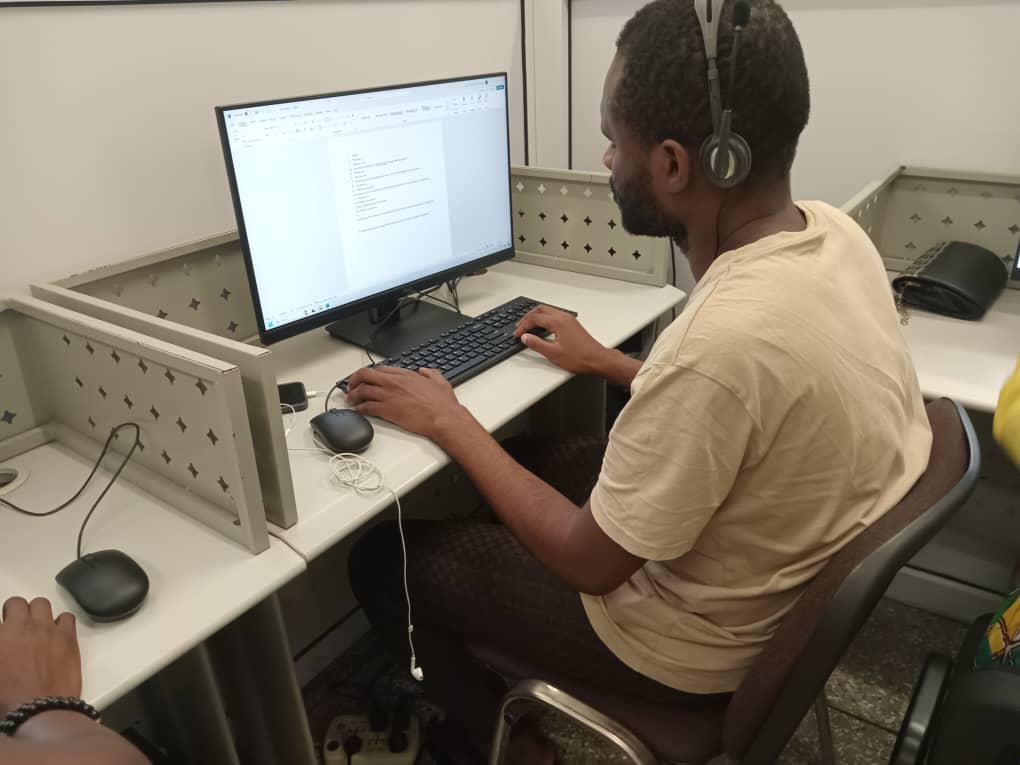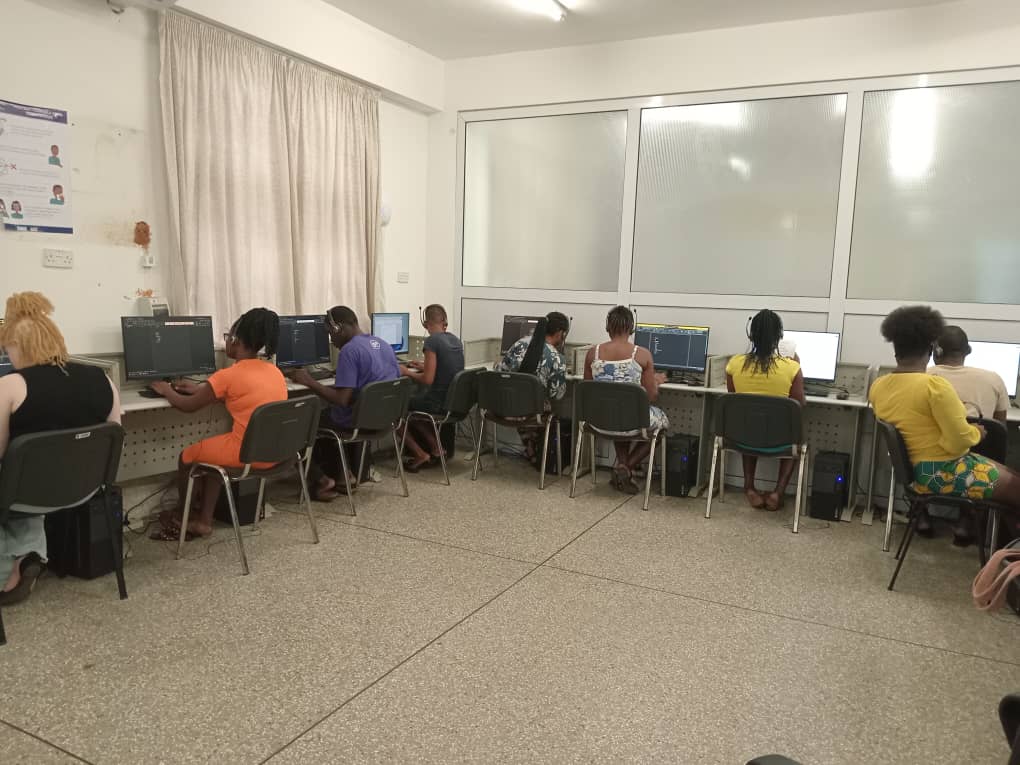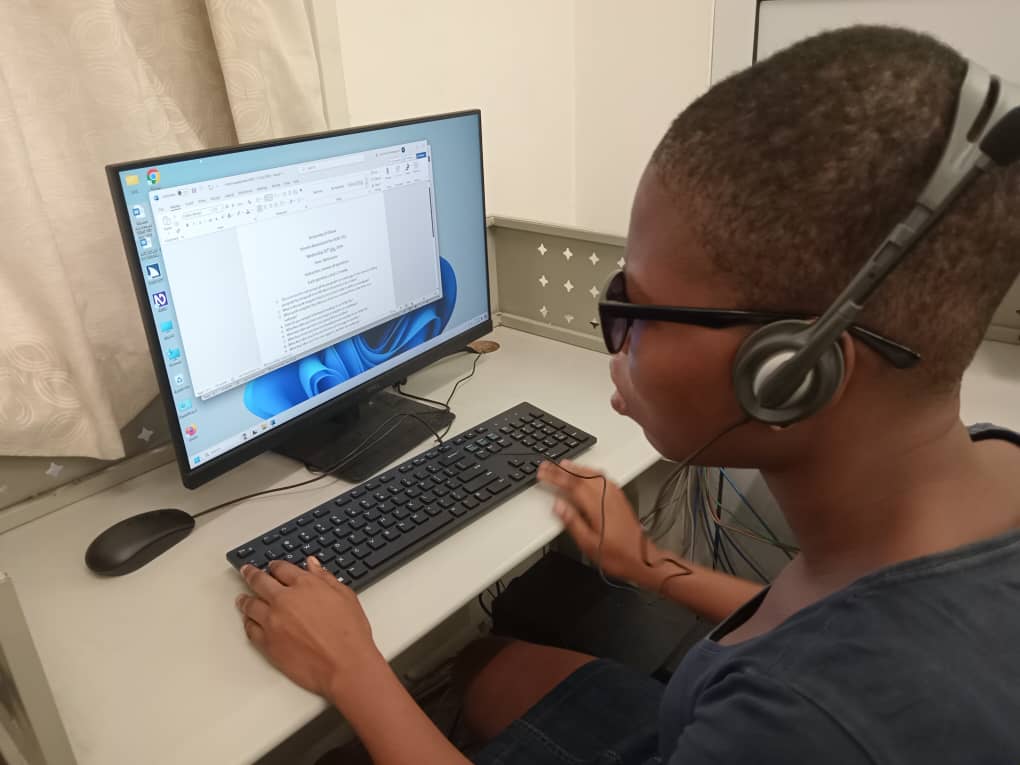ACE Impact showcases institutional impact in supporting global good practices for higher education inclusivity: A case of University of Ghana Enhanced Assertive Technology
In a remarkable step towards inclusivity, the Africa Higher Education Center of Excellence for Development Impact (ACE Impact) has bolstered its support for students with disabilities through the University of Ghana as one of its beneficiaries. This inspiring initiative aims to alleviate the pressures on its Assistive Technology Unit, facilitate the academic progress of students with special needs, and integrate them into the university’s ICT training services, crucial for 21st-century technological competence. The ACE Impact recently equipped the Assistive Technology Unit, at the University of Ghana Computing System Office (UGCS), with 20 brand-new, high-specification desktop computers.
This intervention is a crucial step towards fulfilling a significant part of the ACE Impact project’s disbursement-linked result, which provides ACE Impact host institutions the flexibility to pursue activities focused on Institutional Impact based on need and priority. This budgetary allocation was made available to all 36 universities that host at least one of the 54 ACE Impact centers in West Africa and Djibouti, driving substantial impact across the region.
The University of Ghana’s initiative enhances its capacity to support students and faculty and exemplifies its commitment to adopting global best practices in higher education. According to the World Health Organization (WHO), approximately 15% of the world’s population lives with some form of disability. In Africa, this percentage is slightly higher due to factors such as health conditions, conflict, limited access to health care, infrastructure accessibility, training support, policy environment, and lack of funding.
The University of Ghana, which hosts three ACE Impact centers; the West Africa Centre for Crop Improvement (WACCI), the West Africa Centre for Cell Biology of Infectious Pathogens (WACCBIP), and the West African Genetic Medicine Centre (WAGMC), chose this intervention after careful consideration of UGCS’s inclusive services and their potential impact on the community services, patrons, and humanity, at large, according to Joy Lamptey, Project Lead for ACE Impact Project, University of Ghana’s Office of Institutional Advancement.
Evolution of the Assistive Technology Unit
Established in 2006, the University of Ghana’s Assistive Technology Unit exemplifies the institution’s proactive approach to addressing the needs of visually impaired students. This unit was created in response to numerous requests from concerned students and a comprehensive needs assessment, which highlighted an urgent need to integrate visually impaired students into ICT-related academic activities. The assessment revealed that these students were completely excluded from accessing ICT education and its numerous benefits despite mandatory ICT fees. The unit was thus set up to provide basic ICT skills and support academic activities for visually impaired students, ensuring their inclusion in the digital learning environment.
The establishment of the assistive technology unit in 2006, thus, brought some relief and novelty to the beneficiary visually impaired students. However, the effectiveness of the unit diminished
over time as the traditional system of reading and writing with Braille alone, which the unit initially adopted, proved to be inefficient, particularly during examinations. According to Alexandar Bankole Williams, the Coordinator at the University of Ghana Computing System’s Assistive Technology Unit, who himself is visually impaired, “most initial beneficiary visually impaired students who used the braille for examinations would complain of being awarded low grades and blame the situation on poor transcription and translation of their examination responses,”
The unit responded to this growing concern in 2014 with a few computers; one screen reader, a software application to transform on-screen information into speech or braille to complement the use of only braille; and four desktop video magnifiers, also known as Closed Circuit Television (CCTV) magnifiers, to help low vision people to read, view images, and achieve other daily tasks that require magnification. Subsequently, it also installed other assistive technology gadgets, such as non-visual desktop access (NVDA) to help blind and very low vision students access and interact with the Windows Operating System and Applications, and a ZoomText Screen Magnifier to aid those with some appreciable sight to see and read properly. To be more inclusive, the unit also installed other assistive technology gadgets, such as headphones, and put in other necessary measures to accommodate other students with special needs, such as hearing impairment, physical impairment, and other forms of disability. These connecting devices thus put more pressure on the limited number of computers.

ACE Impact Project’s Timely Intervention
At the WACCBIP Research Conference 2024, Professor Nana Aba Amfo, Vice Chancellor of the University of Ghana, highlighted the transformative impact of the ACE Impact project on the university community. She underscored the project’s vital role in enhancing the experiences of both students and faculty, particularly through its focus on digitalization and inclusivity:
“The project has supported initiatives to enhance the UG students’ experience through digitalization,” Professor Amfo noted. “It promotes inclusivity by equipping the assistive technology laboratory, thereby improving the teaching and learning support systems for students, faculty, and staff with disabilities.”
By 2024, the unit’s resources were outdated and insufficient. The ACE Impact project’s allocation in January 2024 brought a much-needed upgrade with 20 high-spec new computers, significantly enhancing the unit’s capacity.
“Before the ACE Impact project’s intervention, we had only ten functioning computers for over 300 registered students with special needs. These new computers will help reduce the long waiting times and improve the overall learning experience,” noted Alexander Bankole Williams, Coordinator of the Assistive Technology Unit.
Impact on Students
The new equipment has already made a significant impact. “In the past, we struggled to gain sufficient ICT skills,” said Felicia Amoako, a second-year student of Sociology, Social Work, and Religion. “With these new computers, we can now focus on improving our Braille writing skills and enhancing our employability.”
Isaiah Amada-Awuku, studying Economics, Mathematics, and Statistics, echoed this sentiment. “Having more access to these computers has boosted our self-esteem and self-confidence. We are now less dependent on others and can learn at our own time and pace.”
Future Needs and Expansion
Despite these improvements, challenges remain. The 28-seater space in the UGCS office is insufficient for the growing number of students. Mr. Williams highlighted the need for additional support: “We have a 40-seater space upstairs that is currently inaccessible due to the lack of an elevator or ramps. We need more assistive technological devices to fully empower our students with special needs.” Hence, they are confined to the ground floor, which has limited seating capacity and equipment.
The unit also needs financial resources to purchase more assistive technological devices. “With these devices in place, we will empower the special-needs students with the needed ICT skills and even encourage others who feel embarrassed by the situation to own up. We need more assistive technological devices for our students with special needs,” Mr. Williams emphasized.
Broader Impact and Commitment
The university is committed to strengthening its Office of Institutional Advancement to effectively implement activities related to institutional impact. In line with this commitment, the university has other impactful activities, such as strengthening internet connectivity and enhancing online learning management. Ultimately, these efforts align with the ACE Impact project’s goals of leveraging cross-border teaching opportunities and supporting the university’s regional strategy.
Conclusion
The University of Ghana’s proactive measures, supported by the ACE Impact World Bank grant, demonstrate a robust commitment to inclusivity in higher education. By enhancing its Assistive Technology Unit and other institutional capacities, the university is not only addressing the immediate needs of its students with disabilities but also setting a benchmark for other institutions in the region.

